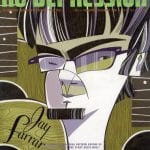Hello Stranger from Issue #36
Ordinarily we don’t discover the connective tissue of each issue until these late moments, when certain words or songs or ideas reveal themselves to be themes running through our pages.
Not this time, of course.
Friday night, September 14, was to have been the kickoff for the second annual Americana Music Association convention, here in Nashville. Instead it became one of many hastily convened benefits for the American Red Cross. I don’t think any of us believed our $10 donation at the door would change all that much, but I do know that I needed to be around friends and away from the television. And that doing something might help.
Even so, I could not drink, and only rarely found words. A few moments before Greg Trooper began to play, I turned to his manager, Leslie Rouffe, and mumbled, “It’s a bad week to be a pacifist.” A few minutes later, Greg said the same thing from the stage, though we’d not spoken.
During the Gulf War, my friend and mentor Art Chantry (in whose design studio this magazine was born) argued that we liberals needed to reclaim the American flag. But of course we didn’t, and I suppose we won’t.
They fly everywhere now, those flags, and I wish I found comfort in that. I wish that long years of experience had not taught me to mistrust those — of either party — who lead the United States. And I wish that most of the messages we receive in hourly updates from our media did not seem so thoroughly convinced of the correctness of our government’s actions.
Not simply because it is the American tradition to mistrust government, but because the causes and effects of Middle Eastern terrorism are enormously complex, and do not easily reduce to the scripted black-and-white of soundbites.
It is no longer possible to believe that the best and brightest are drawn to government service; blame Richard Nixon for his egregious violations of public trust, and Ronald Reagan for fostering a society in which greed was good, and poverty was an acknowledged, Darwinian consequence of capitalism.
I know, I know…this is a music magazine, and I stray from my province as a critic. Again. But music, and the words we write about it, emerge from the culture around us — not from a vacuum — and provide a mirror through which society may see itself.
We are told — and we believe — that our lives will never be the same after September 11. That much, at least, should be true. We would be poor examples of our species if we were able to forget mass death easily.
How we will be changed — how we will permit ourselves to be changed — is still open to negotiation, though it seems not often to be questioned. Will we respond with such open pocketbooks to the next act of terrorism on our soil? We have, after all, been told this is war (and a long war at that), and our enemies have clearly indicated their desire to play on our field. How will we respond after the fifth atrocity? The tenth?
And if we go along that road, how quickly will we yield the Bill of Rights to growing security concerns? How soon will it become impossible for our Arab-American neighbors (their mosque is right up the street) to function in our pluralistic society? How willing will we be to fight poverty at home and abroad, to provide security for our elderly, to make health care affordable, to fund education, if our economy is truly to go on war footing?
Naturally, I realize that some — perhaps many — of you do not share my politics. But please do this: Please continue to give your time and money to causes which will improve life in this country, and abroad; please urge your elected officials to wage peace with the same ferocity they seem willing to wage war. And please continue to engage in dialogues about how best we may live as individuals, as members of this society, and as citizens of this world.
This Sunday morning, while most of my neighbors were at church, we began hostilities in Afghanistan. Once again I am reminded of the words my wife read at a wedding last weekend: Without love, we have nothing.




